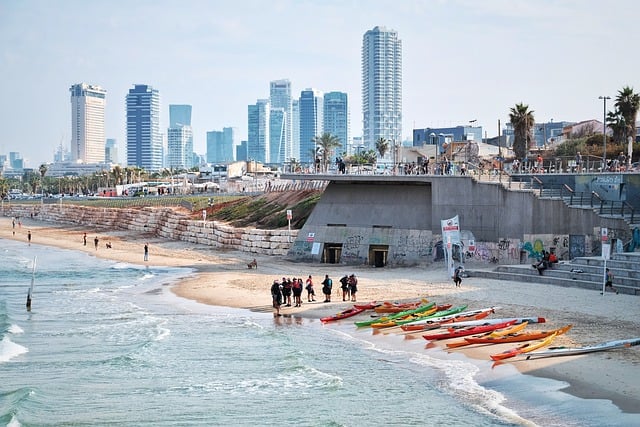
The recent credit rating downgrade of Israel by Moody's from A2 to Baa1 has cast a shadow of apprehension across the financial and political landscapes. Many, understandably, harbor anxieties about a potential domino effect of further downgrades, potentially pushing Israel's economy into a downward spiral, echoing the plight of developing nations. While such fears are not to be dismissed, a different narrative unfolds, a narrative that Moody's – and perhaps some other economic observers – have yet to fully grasp.
The same weekend that Moody's released its report, a seismic shift occurred on the ground. The assassination of Hezbollah leader Hassan Nasrallah drastically altered the region's strategic reality. This event, while seemingly unrelated to the downgrade, has elicited a distinct response from the capital markets. Since Nasrallah's demise, the Israeli market has exhibited remarkable resilience, even experiencing surprising growth in certain sectors. This divergence between Moody's cautious rating and the market's upward trajectory speaks volumes about the underlying dynamics at play.
Beyond the Downgrade: A New Era of Potential
Despite the implications of Moody's credit rating, the assassination of Nasrallah marks a pivotal turning point in the regional strategic balance. Investors, attuned to the nuances of global affairs, recognize that this new reality heralds a period of potentially profound transformation. The market's buoyant behavior reflects their anticipation of long-term stability, even growth, in a region long steeped in conflict. It is no mere coincidence that the Tel Aviv Stock Exchange displayed positive momentum immediately following the news of the assassination, notwithstanding the downgrade.
Furthermore, if the forthcoming security arrangement, born from the significant weakening of Hezbollah and Iran, paves the way for genuine peace – not just a temporary lull – the Israeli economy could embark on a new chapter of recovery and growth. The assassination of Nasrallah presents a unique opportunity for a lasting peace, which could revitalize the Israeli economy and unleash its full potential. This scenario, while promising, was not factored into Moody's assessment as the report was published before the assassination.
Unpacking Moody's Concerns: A Closer Look
Moody's report sheds light on several economic challenges facing the Israeli government, including the country's budget deficit and the shortage of Palestinian laborers in the real estate sector. While these issues are not inconsequential, they are not insurmountable. For example, Israel has been actively increasing the number of foreign workers to bridge the gap in the building sector, and the sector continues to experience a robust construction pipeline. Despite labor shortages, the Israeli real estate market is witnessing vigorous activity, fueled by a combination of foreign investment and robust local demand.
Moreover, Moody's concerns about budget deficits are likely to diminish if the security situation stabilizes. A sustained peace would create an environment conducive to the flourishing of Israel's tech sector, real estate, and consumer markets, which are already robust and relatively stable. Furthermore, the unwavering financial support from the American government and the Jewish Diaspora remains a crucial factor that could accelerate Israel's economic recovery.
The Resilience of Israel's Economy
Despite the Baa1 rating, Israel's economy is demonstrably more resilient than those of other nations within the same category. This resilience stems from a constellation of factors that Moody's report underplays. One such factor is Israel's technological and military superiority, vividly displayed in recent events. This prowess extends beyond the battlefield and translates directly into economic strength.
A Technological and Military Edge
Israel's hi-tech sector, coupled with its formidable defense industry, remains an attractive target for both civilian and military investors. The world recognizes Israel's edge in these fields. As a result, we are likely to witness an upsurge in foreign investment in these sectors in the foreseeable future.
The Entrepreneurial Spirit
Israel's resilience is not merely about surviving conflict; it's about thriving during and after periods of upheaval. The Israeli economy is fundamentally distinct from those of other Baa1-rated nations. This distinctiveness is deeply rooted in the entrepreneurial spirit that defines the nation. This entrepreneurial spirit fuels a vibrant and dynamic economy, characterized by innovation and adaptability, which are critical for navigating periods of uncertainty.
Looking Ahead: A Potential Positive Domino Effect
While we must remain cognizant of the potential negative repercussions of the downgrade, it is equally essential to consider the possibility of a positive domino effect following the recent geopolitical shifts. Israel's impressive military and technological achievements, coupled with a new geopolitical landscape, could pave the way for unprecedented economic opportunities. These opportunities, amplified by the entrepreneurial spirit that defines Israel, could propel the nation toward a much faster recovery than Moody's currently predicts.
The future of Israel's economy hinges on its ability to leverage these unique advantages. The nation's robust tech and defense sectors, combined with its unwavering entrepreneurial spirit, offer immense potential for growth and prosperity. The recent geopolitical shifts have presented new challenges, but they have also created new opportunities. It is up to Israel to seize these opportunities and forge a path towards a brighter economic future.
How can Israel capitalize on these emerging opportunities and navigate the potential challenges of a changing geopolitical landscape? What strategies can be employed to unlock the full potential of its tech and defense sectors and nurture its entrepreneurial spirit? The answers to these questions will determine the shape of Israel's economic future.
Space for advertisement
BUSINESS
Oct 25, 2024
Beyond Moody's: Israel's Resilient Economy Amidst Geopolitical Shifts
Moody's downgrade of Israel's credit rating has raised concerns, but the assassination of Hezbollah's leader and potential for peace could lead to a new economic era for Israel.

